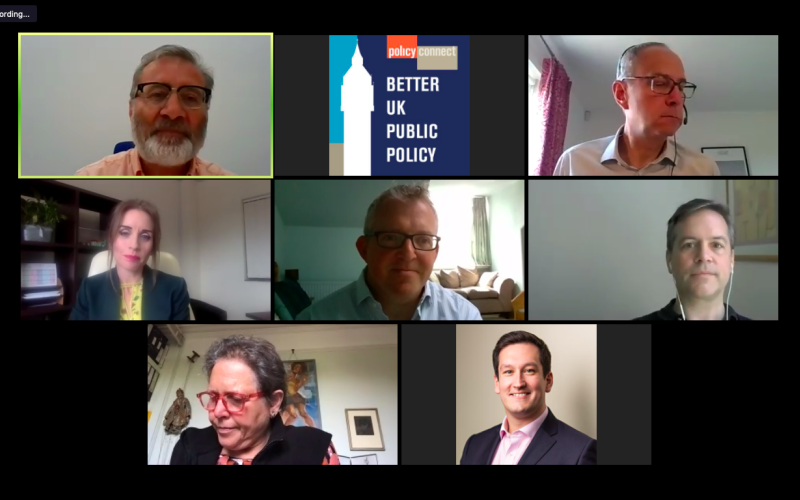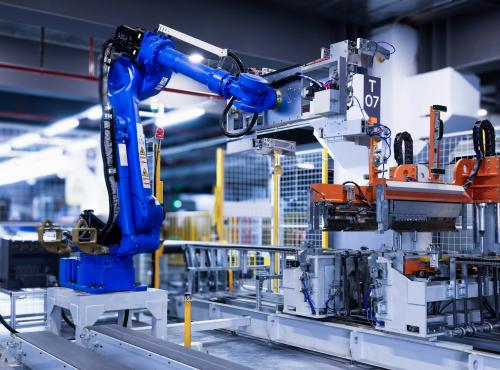APMG Holds Financing the recovery webinar
On Thursday 7th May, the APMG brought together a distinguished panel of expert voices from across finance and industry for a webinar chaired by APMG Co-Chair Mark Pawsey MP to discuss what the manufacturing sector needs to recover from the COVID-19 crisis and drive the whole economy forward.
The APMG's first webinar featured a panel of experts and leaders from the financial sector, the wider manufacturing community and SME businesses who addressed an audience drawn from across the manufacturing and wider business community. Mark Pawsey opened the meeting, welcoming attendees and panelists and explaining that the webinar had been convened to give background on the current picture of finance for industry, and to look at what the immediate future might hold for the sector.
The first speaker, Mike Rigby, the Head of Manufacturing at Barclays Bank explained the current picture regarding corporate finance for manufacturing. Mike explained that the action by government has allowed Barclays alone to issue over £8bn to publicly rated businesses alone. He explained there have to date been over 33,000 successful CPILS applications totalling over £5.5bn. Finally Mike covered the small/micro business Bounceback loan scheme for which Barclays alone have had over 32,000 applications. Mark Pawsey MP asked how terms were being ajdusted to support businesses forced to take these loans, which Mike explained is in review and that additional loans are being offered on repayment holidays in order to support business as much as possible.
The second speaker was Tim Figures, Director of Technology, Sustainability & Innovation at Make UK who set out the buisness organisation's perspective on the current situation and the recovery. Tim first made the point that Manufacturing as a sector was never asked to close by the government, which was positive, but also meant that a full return would take more than a ministerial order to reinstate demand and support disrupted supply chains to return to normal. Currently, Tim explained that the lack of certainty in the sector is causing concern around finance as businesses are unable to plan their finance for the coming months or years, especially for those relying on invoice financing and/or credit insurance. Tim explained that industry will need considerable flexible working capital to return to normal, but also flexible working and prompt payment which should be supported by large businesses receiving state support being compelled to give fair payment terms and that this should be overseen by the small business commissioner.
Third, attendees heard from Laura McBrown, Managing Director at G&B Electronic Manufacturing Services who provided an insight into the experience of SME manufacturers. Laura stressed that while most customers were still meeting fair payment terms, they were often delaying orders, which caused large holding of finished goods with no payment. She also explained that the biggest issue facing her business was that the uncertainty in terms of timescale was causing a double lag behind the economy as OEMs orders were frozen, causing a lag down the supply chain, which already runs slightly behind the main economy, Laura explained that her current forecasts were for around 18 months of disruption due to a customer base who are in industries badly effected by the current crisis. Laura stressed that government must remain cogniscant that even as the main of the economy returns to normality, manufacturing will return slightly behind the rest, and so support must remain for industry. Finally Laura also highlighted Britain's exit from the European Union, stressing that additional impacts to supply chains already reeling from the COVID-19 crisis would be too much to take for many businesses.
Finally, Duncan Johnston, Industrial Products & Construction Leader at Deloitte presented on his forcasts for growth in the manufacturing sector, related sectors and economies as well as his thoughts on how the country can achieve a speedy recovery. Duncan explained that Deloitte are modelling using a version of the Imperial College Model which analyses progress of the Coronavirus and uses the consequent restrictions to predict the economic impact. He highlighted sector specific issues such as the existing pressures in automotive that pre-dated the virus, but were hugely exacerbated by the lockdown and the consequent impact on new car sales and the knock on impact on airlines and how this has affected the aerospace sector which is expected to last for 3-4 years. However, Duncan explained that the recovery in wider manufacturing sector is expected to be in line with the return of capital expenditure, and as it returns, manufacturing is likely to recover swiftly. Duncan stressed the importance of agility in businesses to a strong recovery, he also stressed the importance of the application of new technologies such as robotics, additive and other 4IR technologies.
Following this there was an audience Q&A, with questions on the government's schemes, the availability of finance, the value of local supply chains and how government can support industry through the return to work. APMG Co-Chair Mark Pawsey MP summarised the discussion, highlighting the many positives of the government schemes that have been put in place and stressed the importance of the group continuing to work on the effects of and the recovery from cornonavirus for the manufacturing over the coming months. As a result the APMG will be convening a number of webinars via Zoom to discuss salient issues which have arisen from the current crisis.




